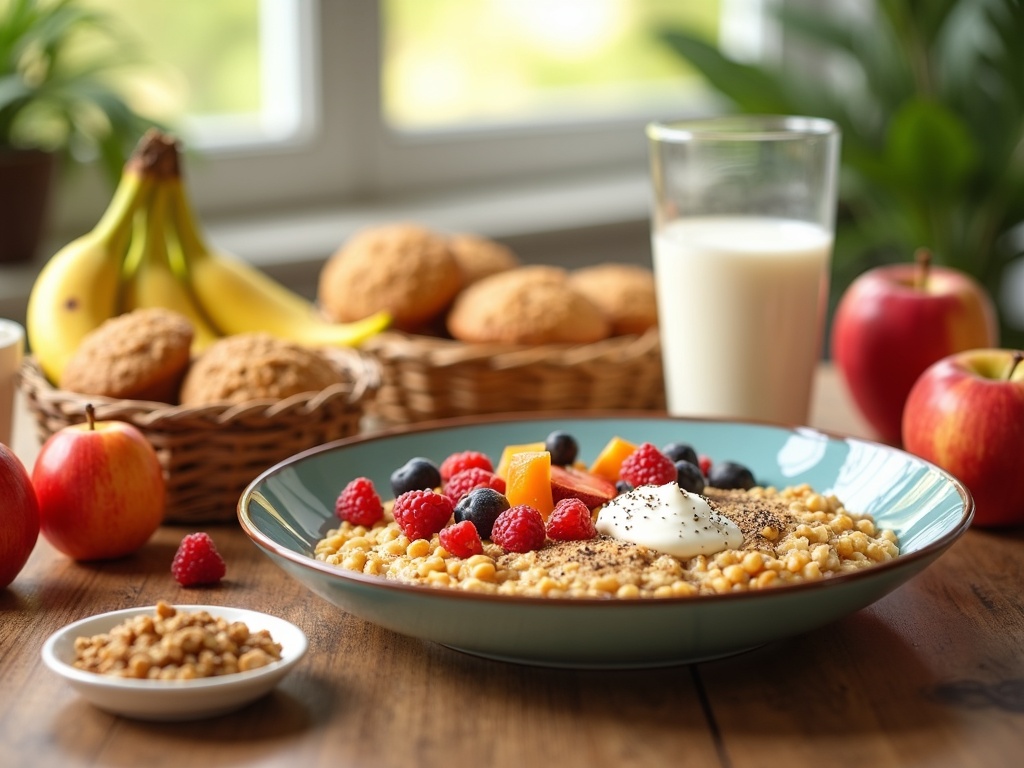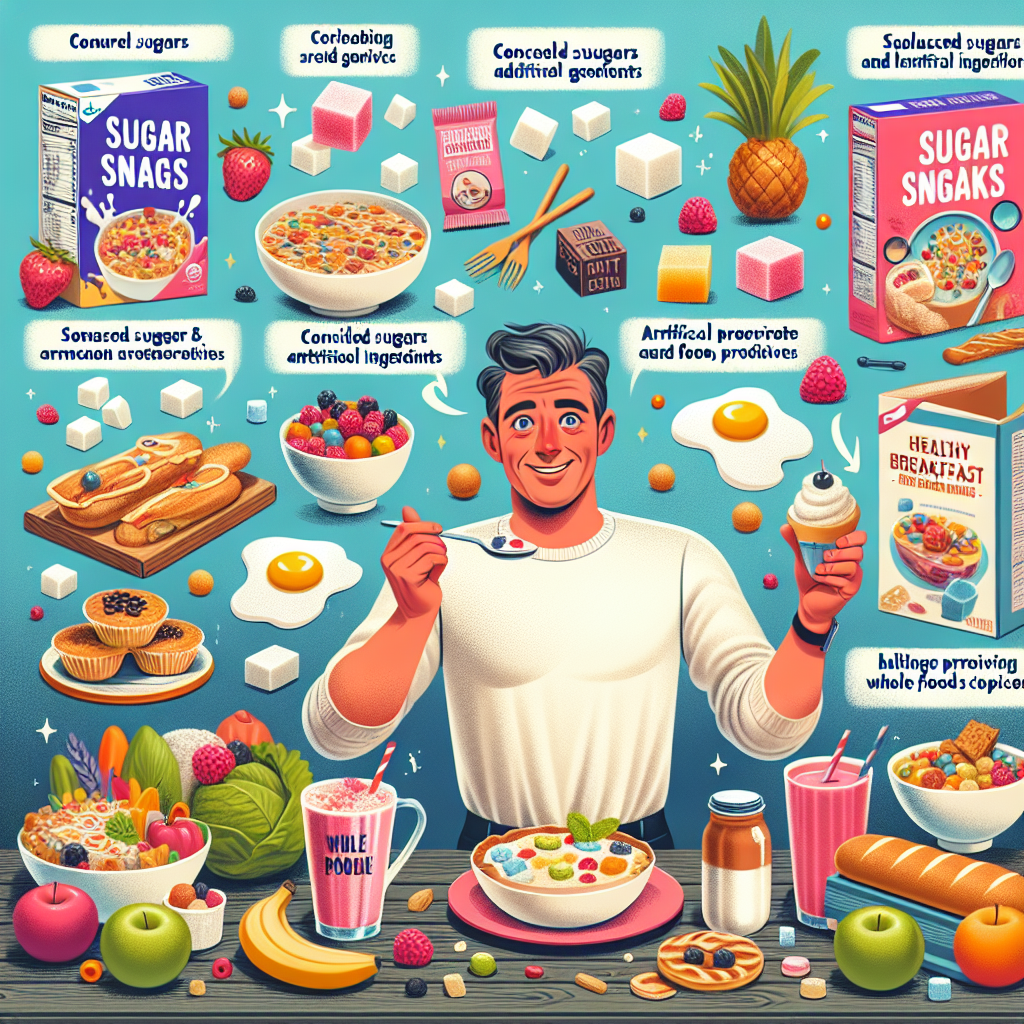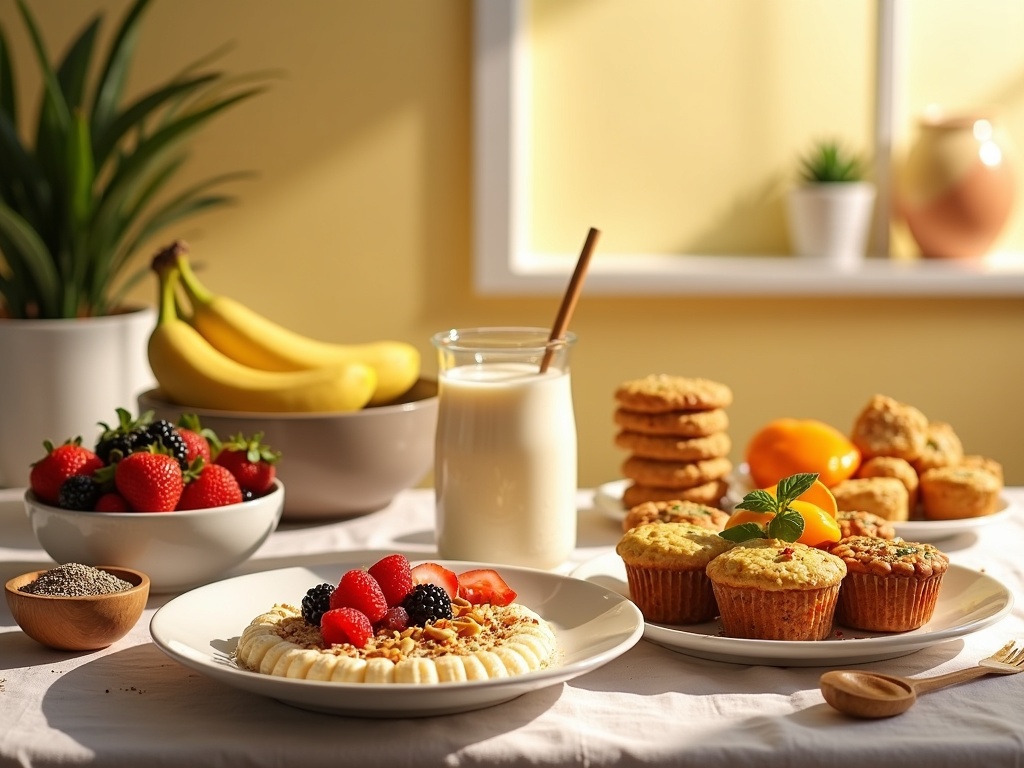Dear Breakfast plays a crucial role in daily wellness, yet about 30% of adults skip this important meal, hurting their concentration and increasing cravings throughout the day. Research consistently shows that eating breakfast enhances cognitive performance, regulates weight, improves mood, and helps prevent metabolic disorders by providing essential fuel after the overnight fast.
Find In This Article
Key Takeaways
- Students who eat breakfast perform noticeably better on cognitive tests compared to those who skip their morning meal.
- Breakfast helps stabilize blood sugar levels, preventing energy crashes and supporting better food choices throughout the day.
- A balanced breakfast should include four essential components: fruits, whole grains, protein, and key nutrients like fiber, vitamins, calcium, and iron.
- Quick options like overnight oats can be prepared in advance for busy mornings while still delivering substantial nutrition.
- Common breakfast mistakes include consuming high-sugar cereals, skipping the meal entirely, and relying on heavily processed foods with little nutritional value.
Why Breakfast Matters More Than You Think
I can’t stress enough how important your morning meal truly is. Despite this, about 30% of adults regularly skip breakfast, not realizing they’re setting themselves up for decreased concentration and stronger cravings throughout the day.
The Science Behind Breakfast Benefits
Research has consistently shown that eating breakfast has significant effects on cognitive performance. After the overnight fast, your body needs fuel to kickstart brain function. When you skip breakfast, you’re essentially asking your brain to run on empty. Students who eat breakfast perform noticeably better on cognitive tests compared to those who don’t.
Breakfast does more than just satisfy immediate hunger. It helps regulate weight by preventing overeating later in the day. Many healthy egg breakfast options provide sustained energy that keeps you feeling full longer. This morning meal also improves mood and enhances memory, giving you the mental edge needed to tackle daily challenges.
Health Protection Beyond Energy
The benefits extend far beyond just feeling better in the morning. Breakfast is actually recommended as a preventive measure against obesity and metabolic disorders. When you skip breakfast, your body’s metabolism slows down, making it harder to burn calories throughout the day.
Here are some key ways breakfast supports your health:
- Stabilizes blood sugar levels, preventing energy crashes
- Provides essential nutrients often missed in other meals
- Creates a foundation for better food choices throughout the day
- Supports muscle maintenance when you include protein-rich breakfast options
I’ve found that incorporating variety helps maintain the breakfast habit. Alternating between breakfast quiche and breakfast muffins keeps mornings interesting while delivering essential nutrients.
For those with busy schedules, planning ahead makes all the difference. Easy breakfast foods that can be prepared in advance ensure you don’t miss out on these benefits even on hectic mornings.
The evidence is clear: making time for the best breakfast foods isn’t just about tradition—it’s a powerful health strategy that impacts everything from your waistline to your brain power. Even a simple, quick breakfast beats no breakfast when it comes to supporting your health and cognitive function throughout the day.
Essential Ingredients for a Power-Packed Morning
Starting my day with the right breakfast ingredients gives me lasting energy and focus. I’ve found that combining specific food groups creates the perfect balance for morning fuel.
Building Your Breakfast Foundation
A power breakfast needs four essential components: fruits, whole grains, protein, and key nutrients. I always include one serving of fruit, like a banana or apple, which provides natural sugars for immediate energy plus vital vitamins. Adding a cup of whole grains such as hearty oatmeal with eggs or quinoa delivers complex carbohydrates that release energy slowly throughout the morning.
Protein is non-negotiable in my morning routine. One good source—like eggs, Greek yogurt, or plant-based alternatives—keeps hunger at bay until lunch. I’ve noticed that mornings with protein-rich breakfast options lead to fewer mid-morning cravings and better concentration.
The best breakfast choices contain these key nutrients:
- Fiber: Keeps digestion regular and prolongs satiety
- Vitamins: Support immune function and overall health
- Calcium: Essential for bone health and muscle function
- Iron: Crucial for energy and oxygen transport
For whole grains, I rotate between steel-cut oatmeal, whole grain breakfast muffins, and quinoa bowls. Each option provides sustained energy without the crash that comes from refined grains.
When selecting fruits, I prefer mixing berries (packed with antioxidants) with bananas (rich in potassium) or apples (fiber-filled). Citrus fruits like oranges add vitamin C for immune support.
The dairy component offers calcium and additional protein. Greek yogurt has become my go-to for its protein content, but I also enjoy cottage cheese or fortified almond milk when I want variety. For easy breakfast foods that deliver maximum nutrition, I often prepare a Greek yogurt parfait with berries and homemade granola.
Protein sources extend beyond eggs to include nut butters spread on whole-grain toast or seeds like chia and flaxseed sprinkled into breakfast quiche or oatmeal. These tiny powerhouses add omega-3 fatty acids and additional fiber.
By combining these best breakfast foods in creative ways, I’ve transformed my morning meal from an afterthought into the nutritional cornerstone of my day. The right ingredients don’t just fuel my body—they set the tone for better choices throughout the day.

Quick and Easy Breakfast Ideas That Actually Work
Mornings can be chaotic, but I’ve found that breakfast doesn’t need to be complicated. I’ve mastered several recipes that take just 15 minutes or less to prepare, perfect for those busy weekdays when time is precious.
Overnight Oats: Your Morning Time-Saver
Overnight oats have been my go-to solution for hectic mornings. The beauty of this breakfast is that your refrigerator does all the work while you sleep. I simply combine ½ cup of oats with 1 cup of almond milk, add 1 tablespoon of chia seeds, slice half a banana, and toss in ¼ cup of fresh berries. After layering these ingredients in a jar and placing it in the refrigerator overnight, I wake up to a perfectly prepared meal.
What makes overnight oats so versatile are the endless customization options:
- Add a dash of cinnamon or vanilla extract for warmth and depth
- Switch between strawberries, blueberries, or blackberries for different antioxidant profiles
- Try chopped almonds, walnuts, or pecans for extra crunch and protein
- Drizzle honey or maple syrup if you prefer additional sweetness
The texture can be adjusted based on your preference too. For a thicker consistency, I reduce the milk slightly or add extra chia seeds. If you prefer a smoother breakfast, a healthy breakfast alternative might be blending the soaked oats briefly.
On days when I crave variety, I prepare breakfast muffins in advance or whip up a quick breakfast quiche with whatever vegetables I have on hand.
The beauty of these easy breakfast foods is that they pack substantial nutrition without requiring extensive kitchen time. My overnight oats deliver complex carbohydrates from the oats, healthy fats from chia seeds, and essential vitamins from fresh fruit.
For those focused on fitness goals, adding a scoop of your favorite protein powder transforms this into a protein-rich breakfast that keeps hunger at bay until lunch. I’ve found that this simple breakfast significantly improves my morning energy levels compared to skipping breakfast or grabbing processed options.
These best breakfast foods aren’t just convenient—they’re genuinely satisfying and adaptable to different dietary needs, making them practical solutions for real-life mornings.
Common Breakfast Mistakes to Avoid
Starting the day right means avoiding breakfast pitfalls that can derail your health goals. I’ve noticed many people stumble into breakfast traps without realizing the impact on their energy and nutrition. Let’s explore the most common breakfast mistakes and how to sidestep them.
Hidden Breakfast Dangers
That colorful cereal box might seem like a convenient morning option, but it’s often a sugar trap in disguise. A shocking 60% of breakfast cereals contain high sugar levels, turning what should be a nutritious start into essentially a dessert. These sugar bombs cause rapid energy spikes followed by crashes that leave you feeling sluggish by mid-morning.
Even products marketed as “healthy” options often hide sugars and additives behind clever packaging. Those granola clusters and breakfast bars frequently pack more sugar than a candy bar! Manufacturers use multiple sugar names on ingredient lists – maltose, dextrose, corn syrup – making it harder to identify just how much sweetener you’re consuming.
Skipping breakfast altogether is another major mistake. When you bypass your morning meal, you’re setting yourself up for overeating and poor food choices later in the day. Your body, deprived of morning nourishment, pushes you toward high-calorie, low-nutrient options when hunger finally strikes.
Processed breakfast foods present another challenge. While they offer convenience, their long-term health impact can be concerning. Many contain artificial preservatives, colors, and flavor enhancers that provide little nutritional value while adding unnecessary chemicals to your diet.
Instead of falling into these traps, I recommend focusing on nutrient-dense egg breakfasts that provide lasting energy. Eggs deliver complete protein and essential nutrients without the sugar crash. For busy mornings, wholesome breakfast muffins made with whole grains and minimal added sugar can be prepared ahead of time.
The best breakfast approach includes:
- Balanced macronutrients (protein, healthy fats, and complex carbs)
- Minimal added sugars (under 5g per serving)
- Whole food ingredients you can pronounce
- Adequate protein to support satiety (aim for 15-25g)
- Fiber-rich components for digestive health
If you’re pressed for time, quick and easy breakfast foods don’t have to come from packages. A smoothie with frozen fruit, yogurt, and a handful of spinach takes just minutes to prepare. Overnight oats prepared the evening before eliminate morning prep time while delivering sustained energy.
For protein lovers, high-protein breakfast options like Greek yogurt parfaits or savory breakfast quiche provide the amino acids needed for muscle maintenance and repair. These choices keep hunger at bay much longer than carb-heavy alternatives.
Remember that what constitutes the best breakfast foods varies between individuals. Some people thrive on heartier morning meals, while others prefer lighter fare. The key is finding nutritious options that energize your particular body and fit your lifestyle.
By avoiding these common breakfast mistakes, you’ll set yourself up for steadier energy levels, better concentration, and improved overall nutrition. Your breakfast choices ripple throughout your day, influencing everything from your mood to your food decisions hours later. A thoughtful morning meal isn’t just about immediate satisfaction – it’s an investment in your day’s success.

Breakfast Options for Every Diet
I’ve found that creating enjoyable breakfast options while accommodating dietary restrictions doesn’t have to be complicated. With roughly 15% of people following vegetarian or vegan diets and about 3 million Americans living with celiac disease, inclusive breakfast ideas are more important than ever.
Plant-Based Morning Meals
Starting your day with a protein-rich vegan breakfast can keep you energized until lunch. A tofu scramble seasoned with turmeric, nutritional yeast, and your favorite vegetables makes a satisfying alternative to scrambled eggs. I like to add black salt (kala namak) for an eggy flavor that makes the transition to plant-based eating easier.
Smoothie bowls are another versatile option that pack nutrition into every spoonful. I create mine with frozen fruits, plant-based yogurt, and protein sources like hemp seeds or plant protein powder. The toppings make all the difference – try granola, fresh berries, and a drizzle of almond butter for added texture and nutrients.
Gluten-Free and Specialty Diets
For those avoiding gluten, breakfast can sometimes feel limiting, but there are plenty of simple breakfast alternatives that are naturally gluten-free. Quinoa breakfast bowls topped with nuts, seeds, and fresh fruit offer complete protein and lasting energy. I prepare a batch of quinoa ahead of time and reheat portions throughout the week for convenience.
Breakfast quiche made with potato or sweet potato crust instead of traditional pastry provides a hearty gluten-free option. Fill it with vegetables and your choice of protein for a meal that works for brunch or breakfast.
For those following paleo guidelines, vegetable-packed omelets served with avocado and fresh fruit create a balanced meal without grains. I emphasize protein-rich breakfast combinations to maintain steady energy levels – think eggs with roasted sweet potatoes and a side of berries.
Healthy egg dishes can be adapted for most dietary needs and remain one of the most versatile breakfast foundations. For vegetarians who include eggs, breakfast muffins made with vegetables and cheese provide a grab-and-go option that’s perfect for busy mornings.
No matter your dietary requirements, focusing on whole foods and quality breakfast ingredients will ensure you’re getting the nutrition needed to start your day right. I’ve found that keeping a well-stocked pantry with versatile ingredients makes accommodating different diets at the breakfast table much simpler.
Sources:
American Journal of Clinical Nutrition – “The Role of Breakfast in Cognitive Function”
Nutrition Journal – “Breakfast Consumption and Its Association with Body Weight and Health”
Academy of Nutrition and Dietetics – “Healthy Breakfast Choices”
Harvard Health – “Eating Breakfast: Important Health Benefits”

